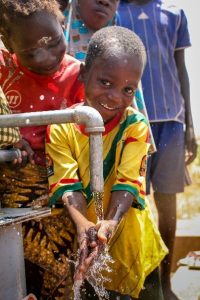By Omair Ali

The COVID-19 pandemic has put a great strain on Niger by creating massive delays in supply distribution and other hurdles that have been detrimental to communities’ well-being. One, particularly concerning consequence of COVID-19, is that many children have not yet received essential vaccinations, leaving many vulnerable to serious infections.
Vaccine-preventable diseases like measles and polio had devastating effects on populations across the globe for centuries until vaccines were created and eventually distributed worldwide. As an immunity-boosting tool, vaccines stimulate our immune system by introducing a weakened microbe, a dead microbe, or a molecule from the microbe into our bodies. By mounting a response against the agent introduced by the vaccine, our immune systems gain memory of a microbe such that it can produce an effective immune response if re-infection occurs. Vaccines work effectively to protect children around the world but are particularly critical in regions like West Africa, where vulnerability to highly fatal infections is high.
Earlier in the pandemic, the World Health Organization advised several countries, including Niger, to postpone their vaccination programs to limit the spread of COVID-19 [1]. Additionally, healthcare workers in Niger have been reassigned to COVID-19 treatment efforts, and vaccine supply chains have been disrupted [1,7]. These measures, along with social distancing restrictions, have stalled vaccine programs. Furthermore, growing fears about COVID-19 have kept parents away from clinics that they view as hotbeds for COVID-19 transmission [1,7].
While the focus on treating and preventing COVID-19 is warranted, especially as Niger has been receiving coronavirus-related aid [2], these efforts shouldn’t impede other public health efforts like vaccine programs. Vaccinations are essential for everyone, especially children. When children don’t receive their recommended vaccines, they are left with very little protection from diseases that have killed millions in past years. As vaccine-preventable diseases, such as polio in Niger and measles in other African nations [1,3], have been reappearing as small-scale outbreaks, unvaccinated children are in an even more vulnerable situation. Additionally, vaccine-preventable diseases have deadlier and more frequent consequences than coronavirus for children, so lack of access to vaccinations further entrenches future generations in extreme poverty.
Reaching all infants and children in Niger has long been a challenge for NGOs. UNICEF’s 2017 vaccine coverage survey revealed that fewer than 4 out of 10 children in Niger received all recommended vaccinations before turning one [5]. The survey also showed that 80.2% of children had received the Penta-3 vaccine, a vaccine that provides coverage against Diphtheria, Tetanus, Meningitis, Hepatitis B, and Polio, which was short of their 90% target [5]. A 2018 vaccine survey shows a decline from 2017 in coverage for all available vaccines, highlighting existing gaps in participation [4]. Part of the problem is a lack of community awareness and health misconceptions, which are further exacerbated by coronavirus-related concerns.
Despite the ongoing challenges, there is hope that Niger can overcome these challenges as vaccination programs resume operations. The World Bank-sponsored Population and Health Support Project has been acting quickly to meet the needs of Nigerien communities. Through the project’s “Rapid Results Initiatives,” Nigeriens have been receiving health services during the pandemic, including active vaccine programs that have been allowed to operate in areas like the Maradi Region [6].
Good health for children has also been hard to achieve in Niger due to a lack of access to clean water. Because of poor water access, families are forced to consume water that is often from sources contaminated with disease-causing microorganisms, which leaves children vulnerable to diseases that can lead to poor growth, permanent injury, or death. In response to Niger’s water crisis, Wells Bring Hope ensures access to clean water by drilling wells that ensure not only the current survival of communities but also a healthy future for children.
Sources:
[1] https://www.bbc.com/news/health-52911972
[4] https://www.who.int/immunization/monitoring_surveillance/data/ner.pdf
[5] https://www.unicef.org/niger/stories/childrens-immunization-everyones-responsibility
[6] https://reliefweb.int/report/niger/rapid-results-initiatives-niger-advancing-women-s-health-outcomes


